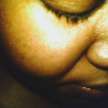Interviews with a Big Black Broad: Session #1
One Woman's Unique Insight into Body Dysmorphic Disorder

Interviewer: When were you diagnosed with BDD?
BBB: I was twenty-eight years old. Only after suffering several bouts of debilitating depression did I succumb to the idea of being honest about the cause. I had no other choice. My depressive episodes where becoming a little manic. Scary. Unpredictable. Unacceptable. I saw several therapists for a few years up until that point. Honestly, I didn’t trust that any of them would understand if I were honest with them about what my problem really was. They would never be able to conceive of it. You see, I had mentioned my issues with self-image to a few people I knew, and they all laughed at me. They were used to me saying awful things about myself since I was a kid. They couldn’t fathom what it really meant. Neither could I. So, I told a forth therapist that I’d seen two weeks after my twenty-eighth birthday what I felt about myself, and he asked me if I knew what Body Dysmorphic Disorder was. I shook my head and told him that I was never an anorexic, bulimic, that I would never sit and stare at myself in any reflective surface for any longer than I had to. That I was too scared to go under the knife for plastic surgery because I was afraid I’d never be able to stop. I shook my head “no” at him when he suggested that this was my problem. Any other reason? He asked. “I’m Black.” I said without hesitation, “Black people don’t suffer from body dysmorphia.”
Interviewer: Why do you believe that black people are immune to BDD?
BBB: Believed, you mean. Growing up, I learned a lot of things about what it meant to be black by listening to and watching the people around me. Mental illness was a white woman’s disease. We, as black people, simply did not have time to entertain these thoughts. A woman cannot be strong and mentally ill in the same space. So being mentally ill is something that a black woman cannot be in any space. As I grew older, I began to see this communal charade for what it was and decided to examine this train of thought for myself. I later rationalized that if I ever admitted to the weakness of having been mentally ill, along with having lacked confidence in myself in any way, not only would I be personally ostracized for my admission, but I would undermine the sufferance of ALL black women everywhere. According to history, we had endured unimaginable things and as a result, we had evolved into emotional superHEROs. There is no time to entertain silly things like mental illness. Particularly, feeling ugly could not be tolerated. The world had told us that we were ugly for centuries, and we had to combat this somehow. Even if only within our own communities. We had to exhibit unwavering self-assurance no matter how we truly felt, no matter who said what about us, to reaffirm our superHERO status. If I’m ashamed of my looks as a black woman, then I am a traitor to this whole system. Perhaps I’m white washed—coveting what it means to be beautiful in the eyes of the others who aren’t black. Mind you, I came of age during the eighties and nineties, and it’s been ten years since I was officially diagnosed, so many may argue that these notions are a little antiquated. Nonetheless, they shaped my first opinions about mental illness in general. Of course, now that I’m grown, I can’t bring myself to agree with any of this. Or at least, I can no longer let it prevent me from seeking the help and support I need. I can’t let these fables decide my fate. Personally, I had to let go of the stigma and do what was best for me by facing this.
Interviewer: What’s it been like for you as a black woman struggling with BDD?
BBB: Well, that loaded question will take several more sessions to answer.






Comments
There are no comments for this story
Be the first to respond and start the conversation.